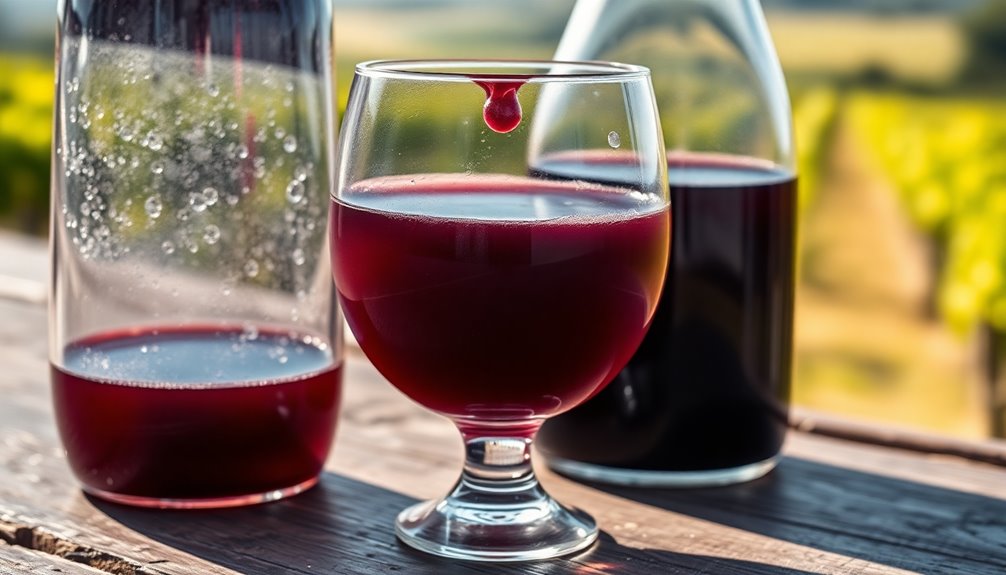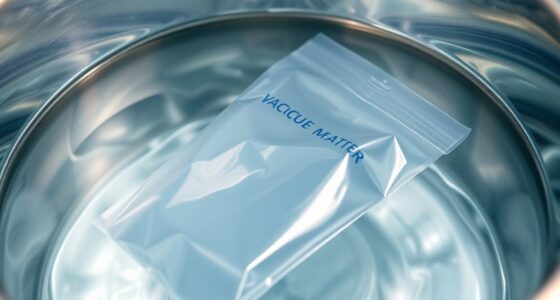Once you open grape juice, it lasts about 7 to 10 days if you refrigerate it right away. Make sure to keep it sealed tightly to prevent contamination and keep it at 40°F (4°C) or lower. If you leave it uncovered or at room temperature, it'll spoil quickly, affecting taste and safety. Keep an eye out for signs of spoilage. There's more to know about storage techniques and safety precautions!
Key Takeaways
- Opened grape juice should be refrigerated immediately to maintain freshness and prevent spoilage.
- When properly refrigerated at 40°F (4°C), opened grape juice lasts about 7 to 10 days.
- Signs of spoilage include off odors, visible mold, and unusual flavors or colors.
- Tightly seal the container after each use to minimize contamination and extend shelf life.
- If frozen, grape juice can maintain quality for 8 to 12 months, but should be thawed safely.
The Importance of Refrigeration for Opened Grape Juice
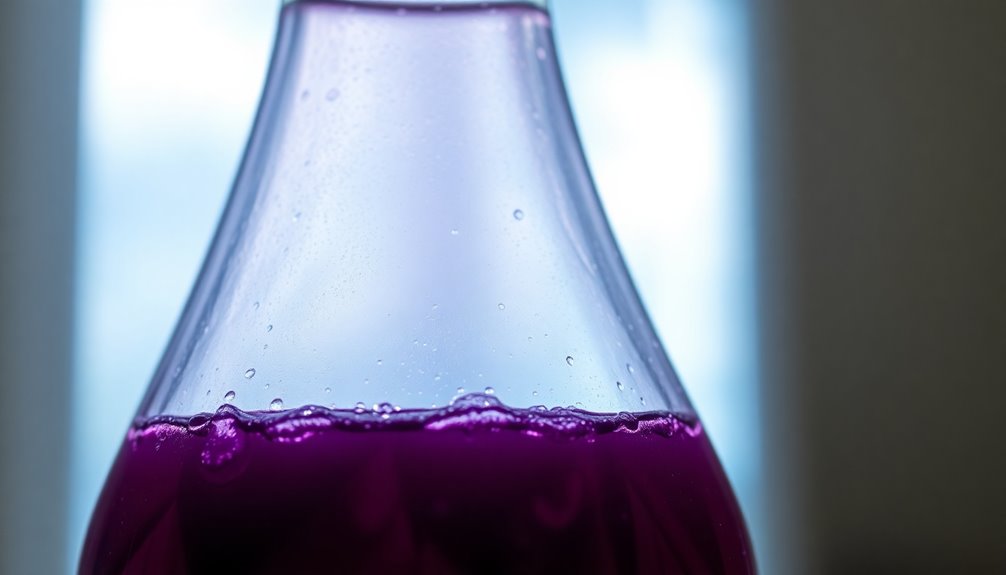
When you open a bottle of grape juice, it's crucial to refrigerate it right away to maintain its freshness and safety.
Keeping opened grape juice at 40°F (4°C) or lower slows microbial growth, helping you avoid spoilage. Proper refrigeration greatly extends its shelf life, allowing you to enjoy it for about 7 to 10 days before the quality starts to decline.
After each use, make sure to tightly seal the container; this prevents contamination and further enhances storage longevity.
Leaving the juice at room temperature can lead to rapid spoilage, compromising both taste and nutritional value.
Shelf Life of Opened Grape Juice
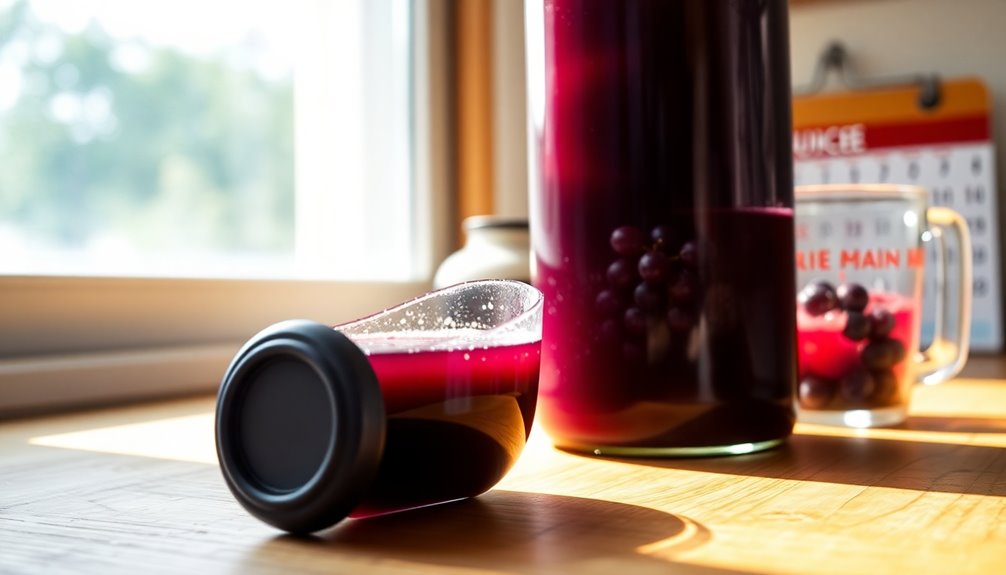
Opened grape juice has a limited shelf life, typically lasting about 7 to 10 days in the refrigerator. To ensure the best quality and flavor, it’s important to consume opened grape juice within this time frame. In contrast, fresh squeezed grapefruit juice shelf life can vary, but it generally lasts about 3 to 5 days when refrigerated. Always check for any off odors or changes in appearance when consuming these juices after they’ve been opened.
If you've stored your opened grape juice properly in an airtight container at 40°F (4°C) or lower, you can enjoy it within this timeframe.
However, if your juice contains preservatives, it might last longer.
To extend shelf life beyond 10 days, consider freezing grape juice; it can maintain its quality for up to 8 to 12 months when frozen.
Remember to check for any signs of spoilage before consuming, as quality degradation can occur.
If you notice off odors or unusual flavors, it's best to discard the juice, especially if it's been opened for over 30 days.
Signs of Spoilage to Watch For
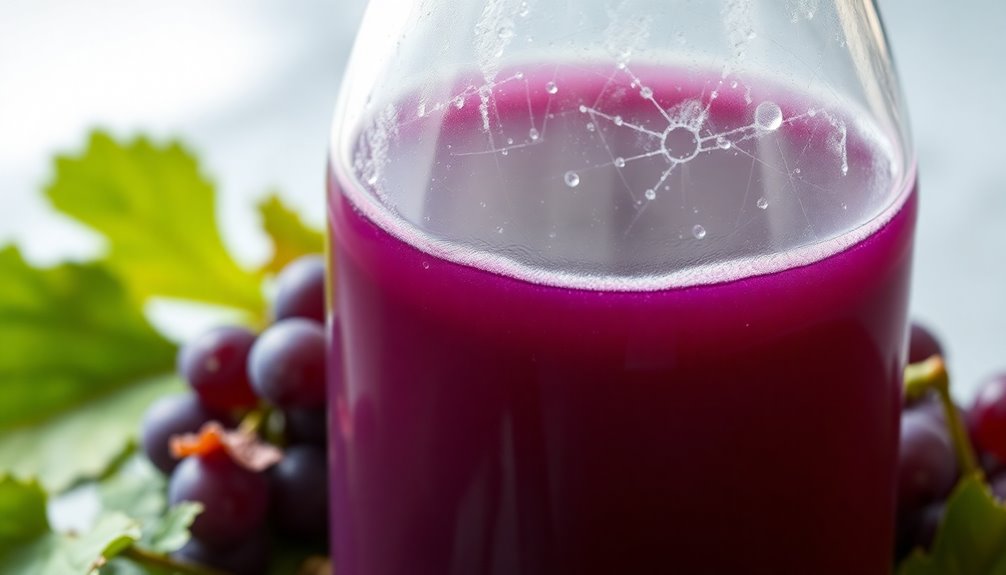
Several clear signs can indicate that your grape juice has spoiled, and being aware of them is essential for your health.
First, if you notice off odors, like sour or fermented smells, it's best to discard the juice.
Visible mold or yeast growth on the surface is another clear sign of spoilage that necessitates immediate disposal.
Additionally, look for unusual particles or significant color changes, as these suggest deterioration.
If the juice tastes sour or fizzy, it's a strong indication it has gone bad.
Ultimately, check for bulging containers or hissing noises when opening, which indicate gas production from bacterial growth, signaling that the juice is no longer safe to drink.
Always prioritize your safety and discard any questionable grape juice.
Proper Storage Techniques for Grape Juice
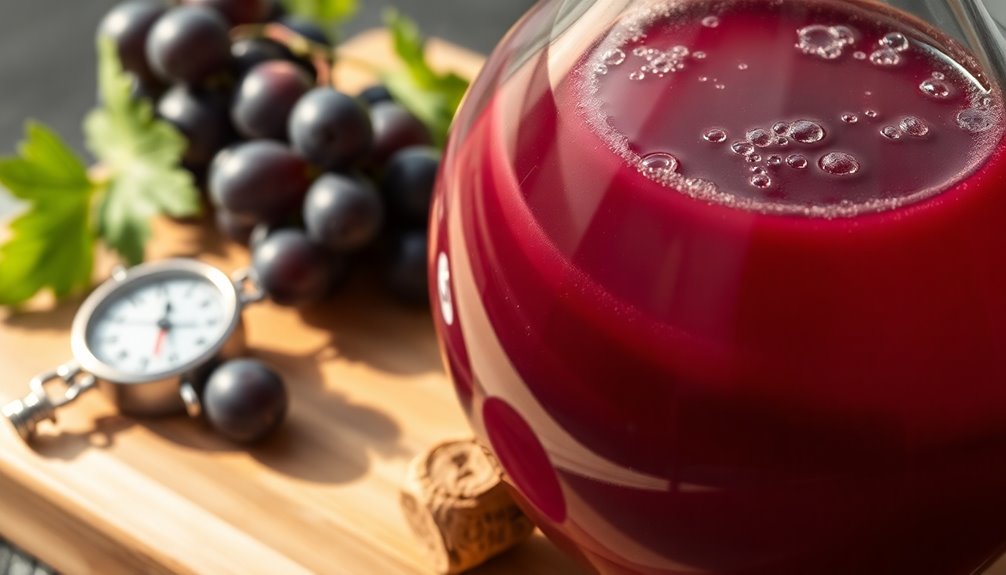
To keep your grape juice fresh after opening, store it in the refrigerator at around 40°F (4°C).
If you won't finish it soon, consider freezing it in an airtight container to extend its shelf life.
Remember to seal the container tightly to prevent contamination and preserve quality.
Refrigeration Guidelines
When you open a bottle of grape juice, it's crucial to refrigerate it promptly to maintain its freshness and safety. Store the opened grape juice in a tightly sealed container at 40°F (4°C) or lower. This helps slow microbial growth, preserving quality for about 7 to 10 days. For maximum freshness, keep it in the coldest part of the fridge rather than the door, where temperature fluctuations can occur. Regularly check for signs of spoilage like off odors or visible mold to confirm it remains safe for consumption.
| Storage Tip | Purpose | Notes |
|---|---|---|
| Refrigerate immediately | Maintain freshness | Slows microbial growth |
| Use tightly sealed container | Prevent contamination | Protects juice from air exposure |
| Store in coldest part | Avoid temperature fluctuations | Guarantees consistent cooling |
| Check for spoilage signs | Verify safety | Look for off odors or mold |
Freezing Storage Tips
If you're looking to extend the shelf life of your grape juice, freezing is a great option. To freeze grape juice effectively, use airtight containers or heavy-duty freezer bags to prevent freezer burn.
Remember to leave at least 1/2 inch of headspace for expansion. Grape juice can maintain peak freshness in the freezer for 8 to 12 months, but it's safe to consume beyond that.
- Enjoy the convenience of having juice on hand!
- Relish the first sip of perfectly preserved flavor!
- Avoid waste and savor every drop!
- Experience the joy of homemade grape juice year-round!
When you decide to thaw grape juice, do it in the refrigerator and consume it within 3 to 5 days.
Always monitor changes to verify quality!
Creative Ways to Use Leftover Grape Juice
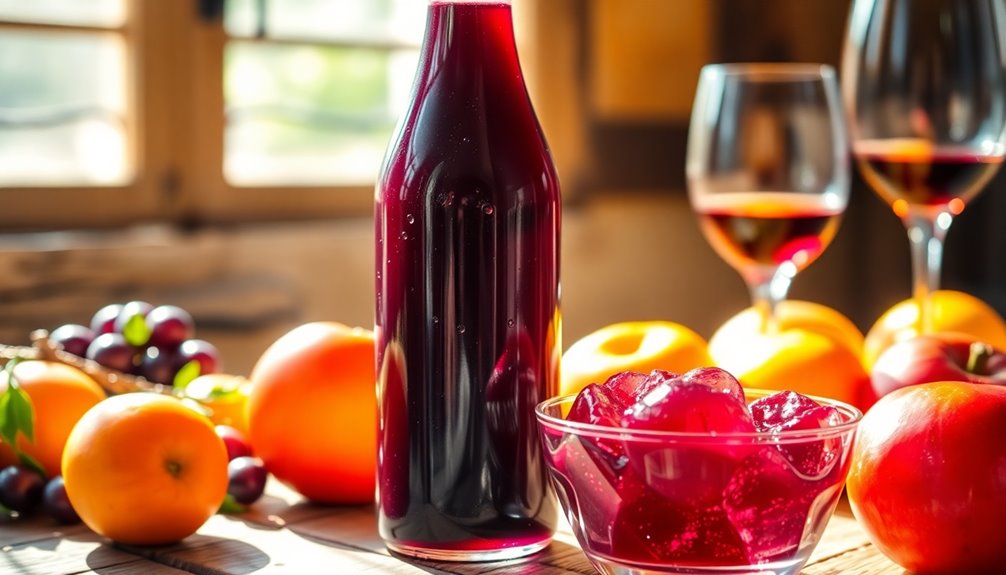
Although you might usually think of grape juice as a simple beverage, there are plenty of creative ways to use leftover juice that can enhance your meals and drinks.
Try making homemade salad dressings by mixing leftover grape juice with olive oil, vinegar, and spices for a deliciously sweet and tangy flavor. You can also whip up a revitalizing grape juice spritzer by combining it with sparkling water and a squeeze of lemon or lime.
Use it as a natural sweetener in smoothies or yogurt, blending it with fruits like bananas and berries. Additionally, incorporate grape juice into marinades for meats or tofu.
Don't forget to freeze leftover grape juice into ice cubes for cocktails or beverages, keeping them cool without dilution!
Safety Precautions for Consuming Grape Juice
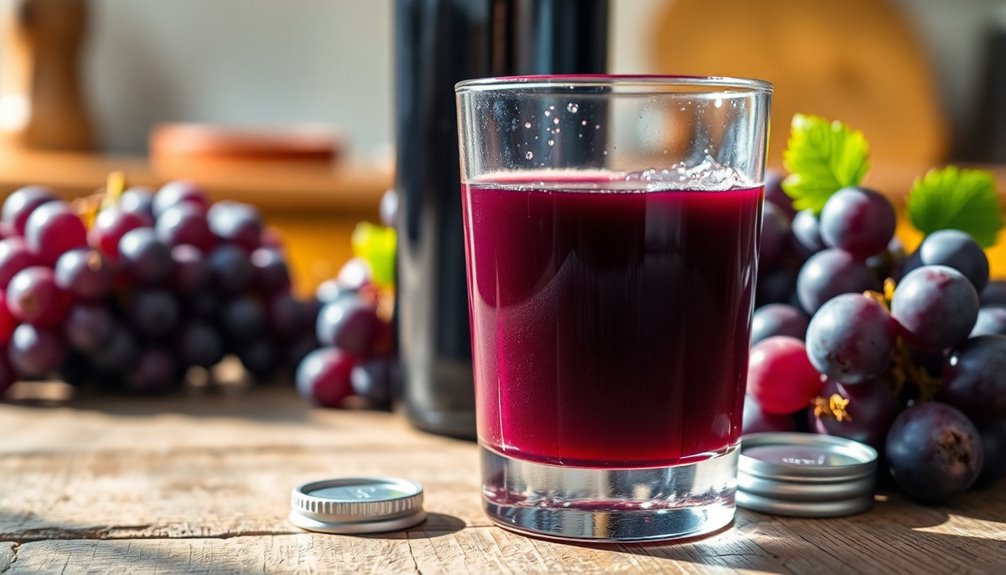
When enjoying grape juice, it's essential to watch for signs of spoilage like off odors or mold.
You should always refrigerate the juice right after opening and keep it tightly sealed to maintain its quality.
If you need to thaw frozen grape juice, make sure to follow safe methods to prevent any health risks.
Check for Spoilage Signs
How can you tell if your grape juice has gone bad? It's essential to check for spoilage signs to guarantee your safety. After opening grape juice, remember to consume it within 7 to 10 days.
Look out for:
- Off odors that signal fermentation
- Sour flavors indicating spoilage
- Visible mold growth that's a definite red flag
- Discoloration or unusual particles that raise concern
Also, don't ignore bulging containers; this could mean gas-producing microorganisms have made the juice unsafe.
Regularly inspecting your opened grape juice helps you avoid unpleasant surprises and keeps your taste buds happy. If you notice any of these spoilage signs, it's best to discard the juice immediately. Stay safe!
Proper Refrigeration Practices
To keep your opened grape juice safe and fresh, refrigerate it immediately after opening.
Store it in a tightly sealed container to prevent spoilage and exposure to air. Ideally, keep the grape juice at 40°F (4°C) or lower, and place it in the coldest part of the refrigerator, avoiding the door where temperatures fluctuate.
You should monitor the juice for any off odors or flavors during its shelf life of 7 to 10 days. Always use clean utensils when pouring to minimize bacteria introduction.
Following these proper storage practices guarantees you enjoy your grape juice with maximum freshness while reducing the risk of spoilage.
Safe Thawing Methods
After ensuring your grape juice is properly refrigerated, you might find yourself in a situation where you need to thaw it.
It's essential to use safe thawing methods to maintain quality and freshness. Here are some tips to keep in mind:
- Always thaw in the refrigerator to minimize bacterial growth.
- If using the microwave or cold water, consume the thawed grape juice immediately.
- Label containers with the thawing date to track freshness.
- Check for off odors or visible signs of spoilage before consuming.
Frequently Asked Questions
How Long Is Grape Juice Good for After Opening?
Once you open grape juice, it's good for about 7 to 10 days if you store it in the fridge at 40°F (4°C) or lower.
Keep an eye on its quality, as it can start to fade after a week.
If you've made homemade juice, expect it to last only 3 to 5 days.
Always check for mold, off odors, or weird flavors before drinking to guarantee it's still safe.
How to Tell if Grape Juice Has Gone Bad?
Imagine pouring a vibrant purple sunset into a glass.
But if your grape juice starts to show signs of decay, it's time to take a closer look.
Check for off odors, unusual particles, or visible mold; these are red flags.
If the juice darkens or becomes cloudy, toss it out.
A sour smell or bulging container signals spoilage, too.
Trust your senses—if it seems off, don't risk your health by drinking it.
What Happens if You Don't Refrigerate Grape Juice After Opening?
If you don't refrigerate grape juice after opening, it can spoil quickly, often within hours.
You might notice off odors or flavors, and it could even develop mold or signs of fermentation.
Leaving it at room temperature encourages harmful bacteria to grow, increasing the risk of foodborne illness.
To enjoy your juice safely, always refrigerate it promptly and keep it tightly sealed to maintain its quality and freshness.
How Long Is Prune Juice Good for After Opening?
After opening, prune juice's good for about 7 to 10 days when you store it in the fridge at or below 40°F (4°C).
Make certain you keep the container tightly sealed to maintain its freshness.
If you leave it out at room temperature for too long, it can spoil faster.
Always check for off odors, strange flavors, or visible mold before consuming to guarantee it's safe.
Conclusion
Now that you know how long opened grape juice lasts, you might think it's too much hassle to store it properly. But keeping it refrigerated and checking for spoilage is a small effort for the enjoyment it brings. Whether you sip it straight, mix it in cocktails, or use it in recipes, you'll make the most of every drop. So don't let your leftover grape juice go to waste—store it right and savor its deliciousness a little longer!
Cindy thoroughly researches juicing trends, techniques, and recipes to provide readers with practical advice and inspiration. Her writing style is accessible, engaging, and designed to make complex concepts easy to understand. Cindy’s dedication to promoting the advantages of juicing shines through her work, empowering readers to make positive changes in their lives through the simple act of juicing.

